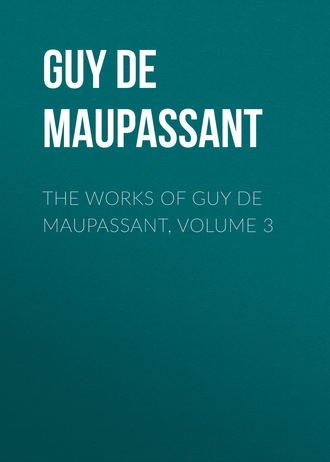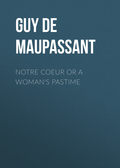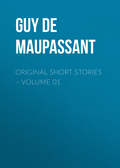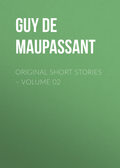
Ги де Мопассан
The Works of Guy de Maupassant, Volume 3
VI
Two days later, I received the following letter, dated the day after we had left, and that had been written at an inn on the high road:
"MY FRIEND,
"I am writing to you, according to my promise. For the moment I am at the inn, where I have just handed my prisoner over to a Prussian officer.
"I must tell you, my friend, that this poor woman has left two children in Germany. She had followed her husband whom she adored, as she did not wish him to be exposed to the risks of war by himself, and as her children were with their grandparents. I have learnt all this since yesterday, and it has turned my ideas of vengeance into more humane feelings. At the very moment when I felt pleasure in insulting this woman, and in threatening her with the most fearful torments, in recalling Piédelot, who had been burnt alive, and in threatening her with a similar death, she looked at me coldly, and said:
"'What have you got to reproach me with, Frenchwoman? You think that you will do right in avenging your husband's death, is not that so?'
"'Yes, I replied.'
"'Very well then; in killing him, I did what you are going to do in burning me. I avenged my husband, for your husband killed him.'
"'Well,' I replied, 'as you approve of this vengeance, prepare to endure it.'
"'I do not fear it.'
"And in fact she did not seem to have lost courage. Her face was calm, and she looked at me without trembling, while I brought wood and dried leaves together, and feverishly threw on to them the powder from some cartridges, which was to make her funeral pile the more cruel.
"I hesitated in my thoughts of persecution for a moment. But the captain was there, pale and covered with blood, and he seemed to be looking at me with his large, glassy eyes, and I applied myself to my work again after kissing his pale lips. Suddenly, however, on raising my head, I saw that she was crying, and I felt rather surprised.
"'So you are frightened?' I said to her.
"'No, but when I saw you kiss your husband, I thought of mine, of all whom I love."
"She continued to sob, but stopping suddenly she said to me in broken words, and in a low voice:
"'Have you any children?'
"A shiver ran over me, for I guessed that this poor woman had some. She asked me to look in a pocketbook which was in her bosom, and in it I saw two photographs of quite young children, a boy and a girl, with those kind, gentle, chubby faces that German children have. In it there were also two locks of light hair and a letter in a large childish hand, and beginning with German words which meant: 'My dear little mother.'
"I could not restrain my tears, my dear friend, and so I untied her, and without venturing to look at the face of my poor, dead husband, who was not to be avenged, I went with her as far as the inn. She is free; I have just left her, and she kissed me with tears. I am going upstairs to my husband; come as soon as possible, my dear friend, to look for our two bodies."
I set off with all speed, and when I arrived, there was a Prussian patrol at the cottage, and when I asked what it all meant, I was told that there was a captain of Franc-tireurs and his wife inside, both dead. I gave their names; they saw that I knew them, and I begged to be allowed to undertake their funeral.
"Somebody has already undertaken it," was the reply. "Go in if you wish to, as you knew them. You can settle about their funeral with their friend."
I went in. The captain and his wife were lying side by side on a bed, and were covered by a sheet. I raised it, and saw that the woman had inflicted a similar wound in her throat to that from which her husband had died.
At the side of the bed there sat, watching and weeping, the woman who had been mentioned to me as their best friend. It was the lancer's wife.
THE COLONEL'S IDEAS
"Upon my word," Colonel Laporte said, "I am old and gouty, my legs are as stiff as two pieces of wood, and yet if a pretty woman were to tell me to go through the eye of a needle, I believe I should take a jump at it, like a clown through a hoop. I shall die like that; it is in the blood. I am an old beau, one of the old school, and the sight of a woman, a pretty woman, stirs me to the tips of my toes. There!
"And then, we are all very much alike in France; we remain cavaliers, cavaliers of love and fortune, since God has been abolished, whose body-guard we really were. But nobody will ever get a woman out of our hearts; there she is, and there she will remain, and we love her, and shall continue to love her, and go on committing all kinds of frolics on her account, as long as there is a France on the map of Europe, and even if France were to be wiped off the map, there would always be Frenchmen left.
"When I am in the presence of a woman, of a pretty woman, I feel capable of anything. By Jove! When I feel her looks penetrating me, her confounded looks which set your blood on fire, I should like to do I don't know what; to fight a duel, to have a row, to smash the furniture, in order to show that I am the strongest, the bravest, the most daring, and the most devoted of men.
"But I am not the only one, certainly not; the whole French army is like me, that I will swear to you. From the common soldier to the general, we all go forward, and to the very end, when there is a woman in the case, a pretty woman. Remember what Joan of Arc made us do formerly! Come, I will make a bet that if a pretty woman had taken command of the army on the eve of Sedan, when Marshal Mac-Mahon was wounded, we should have broken through the Prussian lines, by Jove! and have had a drink out of their guns.
"It was not Trochu, but Saint-Geneviève, who was required in Paris, and I remember a little anecdote of the war which proves that we are capable of everything in the presence of a woman.
"I was a captain, a simple captain, at the time, and I was in command of a detachment of scouts, who were retreating through a district which swarmed with Prussians. We were surrounded, pursued, tired out, and half dead with fatigue and hunger, and by the next day we were bound to reach Bar-sur-Tain, otherwise we should be done for, cut off from the main body and killed. I do not know how we managed to escape so far. However, we had ten leagues to go during the night, ten leagues through the snow, and with empty stomachs, and I thought to myself:
"'It is all over; my poor devils of fellows will never be able to do it.'
"We had eaten nothing since the day before, and the whole day long we remained hidden in a barn, and huddled close together, so as not to feel the cold so much; we did not venture to speak or even move, and we slept by fits and starts, like one sleeps when one is worn out with fatigue.
"It was dark by five o'clock; that wan darkness caused by the snow, and I shook my men. Some of them would not get up; they were almost incapable oí moving or of standing upright, and their joints were stiff from the cold and want of motion.
"In front of us, there was a large expanse of flat, bare country; the snow was still falling like a curtain, in large, white flakes, which concealed everything under a heavy, thick, frozen mantle, a mattress of ice. One might have thought that it was the end of the world.
"'Come, my lads, let us start.'
"They looked at the thick, white dust which was coming down, and they seemed to think: 'We have had enough of this; we may just as well die here!' Then I took out my revolver, and said:
"'I will shoot the first man who flinches.' And so they set off, but very slowly, like men whose legs were of very little use to them, and I sent four of them three hundred yards ahead, to scout, and the others followed pell-mell, walking at random and without any order. I put the strongest in the rear, with orders to quicken the pace of the sluggards with the points of their bayonets… in the back.
"The snow seemed as if it were going to bury us alive; it powdered our kepis15 and cloaks without melting, and made phantoms of us, a species of specters of dead soldiers, who were very tired, and I said to myself: 'We shall never get out of this, except by a miracle.'
"Sometimes we had to stop for a few minutes, on account of those who could not follow us, and then we heard nothing except the falling snow, that vague, almost indiscernible sound which all those flakes make, as they come down together. Some of the men shook themselves, but others did not move, and so I gave the order to set off again; they shouldered their rifles, and with weary feet we set out, when suddenly the scouts fell back. Something had alarmed them; they had heard voices in front of them, and so I sent six men and a sergeant on ahead, and waited.
"All at once a shrill cry, a woman's cry, pierced through the heavy silence of the snow, and in a few minutes they brought back two prisoners, an old man and a girl, and I questioned them in a low voice. They were escaping from the Prussians, who had occupied their house during the evening, and who had got drunk, The father had become alarmed on his daughter's account, and, without even telling their servants, they had made their escape into the darkness. I saw immediately that they belonged to the upper classes, and, as I should have done in any case, I invited them to come with us, and we started off together, and as the old man knew the road, he acted as our guide.
"It had ceased snowing; the stars appeared, and the cold became intense. The girl, who was leaning on her father's arm, walked wrearily, and with jerks, and several times she murmured:
"'I have no feeling at all in my feet;' and I suffered more than she did, I believe, to see that poor little woman dragging herself like that through the snow. But suddenly she stopped, and said:
"'Father, I am so tired that I cannot go any further ther,'
"The old man wanted to carry her, but he could not even lift her up, and she fell on the ground, with a deep sigh. We all came round her, and as for me, I stamped on the ground, not knowing what to do, and quite unable to make up my mind to abandon that man and girl like that, when suddenly one of the soldiers, a Parisian, whom they had nicknamed Pratique, said:
"'Come, comrades, we must carry the young lady, otherwise we shall not show ourselves Frenchmen, confound it!'
"I really believe that I swore with pleasure, and said: 'That is very good of you, my children, and I will take my share of the burden.'
"We could indistinctly see the trees of a little wood on the left, through the darkness, and several men went into it, and soon came back with a bundle of branches twisted into a litter.
"'Who will lend his cloak? It is for a pretty girl, comrades,' Pratique said, and ten cloaks were thrown to him. In a moment, the girl was lying, warm and comfortable, among them, and was raised upon six shoulders. I placed myself at their head, on the right, and very pleased I was with my charge.
"We started off much more briskly, as if we had been having a drink of wine, and I even heard a few jokes. A woman is quite enough to electrify Frenchmen, you see. The soldiers, who were reanimated and warm, had almost reformed their ranks, and an old franc-tireur16 I who was following the litter, waiting for his turn to replace the first of his comrades who might give in, said to one of his neighbors, loud enough for me to hear:
"'I am not a young man, now; but by – , there is nothing like the women to make you feel queer from head to foot!'"
"We went on, almost without stopping, until three o'clock in the morning, when suddenly our scouts fell back again, and soon the whole detachment showed nothing but a vague shadow on the ground, as the men lay on the snow, and I gave my orders in a low voice, and heard the harsh, metallic sound of the cocking of rifles. For there, in the middle of the plain, some strange object was moving about. It might have been taken for some enormous animal running about, which unfolded itself like a serpent, or came together into a coil, suddenly went quickly to the right or left, stopped, and then went on again. But presently that wandering shape came near, and I saw a dozen lancers, one behind the other, who were trying to find their way, which they had lost."
"They were so near by that time, that I could hear the panting of the horses, the clink of their swords, and the creaking of their saddles, and so cried: 'Fire!'"
"Fifty rifle shots broke the stillness of the night, then there were four or five reports, and at last one single shot was heard, and when the smoke had cleared away, we saw that the twelve men and nine horses had fallen. Three of the animals were galloping away at a furious pace, and one of them was dragging the body of its rider, which rebounded from the ground in a terrible manner, whose foot had caught in the stirrup behind it."
"One of the soldiers behind me gave a terrible laugh, and said: 'There are a number of widows there!'"
"Perhaps he was married. And a third added: 'It did not take long!'"
"A head was put out of the litter:
"'What is the matter?' she asked; 'you are fighting?'"
"'It is nothing, Mademoiselle,' I replied; 'we have got rid of a dozen Prussians!'"
"'Poor fellows!' she said. But as she was cold, she quickly disappeared beneath the cloaks again, and we started off once more. We marched on for a long time, and at last the sky began to grow pale. The snow became quite clear, luminous and bright, and a rosy tint appeared in the East, and suddenly a voice in the distance cried:
"'Who goes there?'"
"The whole detachment halted, and I advanced to say who we were. We had reached the French lines, and as my men defiled before the outpost, a commandant on horseback, whom I had informed of what had taken place, asked in a sonorous voice, as he saw the litter pass him: 'What have you there?'"
"And immediately, a small head, covered with light hair, appeared, disheveled and smiling, and replied:"
"'It is I, Monsieur.'"
"At this, the men raised a hearty laugh, and we felt quite light-hearted, while Pratique, who was walking by the side of the litter, waved his kepi, and shouted:"
"'Vive la France!' And I felt really moved. I do not know why, except that I thought it a pretty and gallant thing to say."
"It seemed to me as if we had just saved the whole of France, and had done something that other men could not have done, something simple and really patriotic. I shall never forget that little face, you may be sure, and if I had to give my opinion about abolishing drums, trumpets, and bugles, I should propose to replace them in every regiment by a pretty girl, and that would be even better than playing the Marseillaise. By Jove! It would put some spirit into a trooper to have a Madonna like that, a living Madonna, by the colonel's side."
He was silent for a few moments, and then continued, with an air of conviction, and jerking his head:
"All the same, we are very fond of women, we Frenchmen!"
ONE EVENING
The steamboat Kleber had stopped, and I was admiring the beautiful bay of Bougie, that was opened out before us. The high hills were covered with forests, and in the distance the yellow sands formed a beach of powdered gold, while the sun shed its fiery rays on the white houses of the town.
The warm African breeze blew the odor of that great, mysterious continent into which men of the Northern races but rarely penetrate, into my face. For three months I had been wandering on the borders of that great, unknown world, on the outskirts of that strange world of the ostrich, the camel, the gazelle, the hippopotamus, the gorilla, the lion and the tiger, and the negro. I had seen the Arab galloping like the wind, and passing like a floating standard, and I had slept under those brown tents, the moving habitation of those white birds of the desert, and I felt, as it were, intoxicated with light, with fancy, and with space.
But now, after this final excursion, I should have to start, to return to France and to Paris, that city of useless chatter, of commonplace cares, and of continual hand-shaking, and I should bid adieu to all that I had got to like so much, which was so new to me, which I had scarcely had time to see thoroughly, and which I so much regretted to leave.
A fleet of small boats surrounded the steamer, and, jumping into one rowed by a negro lad, I soon reached the quay near the old Saracen gate, whose gray ruins at the entrance of the Kabyle town, looked like an old escutcheon of nobility. While I was standing by the side of my portmanteau, looking at the great steamer lying at anchor in the roads, and filled with admiration at that unique shore, and that semi-circle of hills, bathed in blue light, which were more beautiful than those of Ajaccio, or of Porto, in Corsica, a heavy hand was laid on my shoulder, and on turning round I saw a tall man with a long beard, dressed in white flannel, and wearing a straw hat, standing by my side, and looking at me with his blue eyes.
"Are you not an old school-fellow of mine?" he said.
"It is very possible. What is your name?"
"Trémoulin."
"By Jove! You were in the same class as I was."
"Ah! Old fellow, I recognized you immediately."
He seemed so pleased, so happy at seeing me, that in an outburst of friendly selfishness, I shook both the hands of my former school-fellow heartily, and felt very pleased at meeting him thus.
For four years Trémoulin had been one of the best and most intimate school friends, one of those whom we are too apt to forget as soon as we leave. In those days he had been a tall, thin fellow, whose head seemed to be too heavy for his body; it was a large, round head, and hung sometimes to the right and sometimes to the left, onto his chest. Trémoulin was very clever, however, and had a marvelous aptitude for learning, and had an instinctive intuition for all literary studies, and gained nearly all the prizes in our class.
We were fully convinced at school, that he would turn out a celebrated man, a poet, no doubt, for he wrote verses, and was full of ingeniously sentimental ideas. His father, who kept a chemist's shop near the Panthéon, was not supposed to be very well off, and I had lost sight of him as soon as he had taken his bachelor's degree, and now I naturally asked him what he was doing there.
"I am a planter," he replied.
"Bah! You really plant?"
"And I have my harvest."
"What is it?"
"Grapes, from which I make wine."
"Is your wine-growing a success?"
"A great success."
"So much the better, old fellow."
"Were you going to the hotel?"
"Of course I was."
"Well, then, you must just come home with me, instead!"
"But! …"
"The matter is settled."
And he said to the young negro who was watching our movements: "Take that home, Al."
And the lad put my portmanteau on his shoulder, and set off, raising the dust with his black feet, while Trémoulin took my arm and led me off. First of all, he asked me about my journey, and what impressions it had had on me, and seeing how enthusiastic I was about it, he seemed to like me better than ever. He lived in an old Moorish house, with an interior courtyard, without any windows looking into the street, and commanded by a terrace, which, in its turn, commanded those of the neighboring houses, as well as the bay, and the forests, the hill, and the open sea, and I could not help exclaiming:
"Ah! That is what I like; the whole of the East lays hold of me in this place. You are indeed lucky to be living here! What nights you must spend upon that terrace! Do you sleep there?"
"Yes, in the summer. We will go onto it this evening. Are you fond of fishing?"
"What kind of fishing?"
"Fishing by torchlight."
"Yes, I am particularly fond of it."
"Very well, then, we will go after dinner, and we will come back and drink sherbet on my roof."
After I had had a bath, he took me to see the charming Kabyle town, a veritable cascade of white houses toppling down to the sea, and then, when it was getting dusk, we went in, and after an excellent dinner, we went down to the quay, and we saw nothing except the fires and the stars, those large, bright, scintillating African stars. A boat was waiting for us, and as soon as we had got in, a man whose face I could not distinguish, began to row, while my friend was getting ready the brazier which he would light later, and he said to me: "You know I have a mania for a fish-spear, and nobody can handle it better than I can."
"Allow me to compliment you on your skill." We had rowed round a kind of mole, and now we were in a small bay full of high rocks, whose shadows looked like towers built in the water, and I suddenly perceived that the sea was phosphorescent, and as the oars moved gently, they seemed to light up moving flames, that followed in our wake, and then died out, and I leant over the side of the boat and watched it, as we glided over that glimmer in the darkness.
Where were we going to? I could not see my neighbors; in fact, I could see nothing but the luminous ripple, and the sparks of water dropping from the oars; it was hot, very hot, and the darkness seemed as hot as a furnace, and this mysterious motion with these two men in that silent boat, had a peculiar effect upon me.
Suddenly the rower stopped. Where were we? I heard a slight scratching noise close to me, and I saw a hand, nothing but a hand applying a lighted match to the iron grating which was fastened over the bows of the boat, which was covered with wood, as if it had been a floating funeral pile, and which soon was blazing brightly and illuminating the boat and the two men, an old, thin, pale, wrinkled sailor, with a pocket-handkerchief tied round his head, instead of a cap, and Trémoulin, whose fair beard glistened in the light.
The other began to row again, while Trémoulin kept throwing wood onto the brazier, which burnt red and brightly. I leant over the side again, and could see the bottom, and a few feet below us there was that strange country of the water, which vivifies plants and animals, just like the air of heaven does. Trémoulin, who was standing in the bows with his body bent forward, and holding the sharp-pointed trident in his hand, was on the look-out with the ardent gaze of a beast of prey watching for its spoil, and, suddenly, with a swift movement, he darted his forked weapon into the sea so vigorously that it secured a large fish swimming near the bottom. It was a conger eel, which managed to wriggle, half dead as it was, into a puddle of the brackish water.
Trémoulin again threw his spear, and when he pulled it up, I saw a great lump of red flesh which palpitated, moved, rolled and unrolled, long, strong, soft feelers round the handle of the trident. It was an octopus, and Trémoulin opened his knife, and with a swift movement plunged it between the eyes, and killed it. And so our fishing continued until the wood began to run short. When there was not enough left to keep up the fire, Trémoulin dipped the braziers into the sea, and we were again buried in darkness.
The old sailor began to row again, slowly and regularly, though I could not tell where the land or where the port was. By-and-bye, however, I saw lights. We were nearing the harbor.
"Are you sleepy?" my friend said to me.
"Not the slightest."
"Then we will go and have a chat on the roof."
"I shall be delighted."
Just as we got onto the terrace, I saw the crescent moon rising behind the mountains, and around us, the white houses, with their flat roofs, descending down towards the sea, while human forms were standing or lying on them, sleeping or dreaming under the stars; whole families wrapped in long gowns, and resting in the calm night, after the heat of the day.
It suddenly seemed to me as if the Eastern mind were taking possession of me, the poetical and legendary spirit of a people with simply and flowery thoughts. My head was full of the Bible and of The Arabian Nights; I could hear the prophets proclaiming miracles, and I could see princesses wearing silk drawers on the roofs of the palaces, while delicate perfumes, whose smoke assumed the forms of genii, were burning on silver dishes, and I said to Trémoulin:
"You are very fortunate in living here."
"I came here quite by accident," he replied.
"By accident?"
"Yes, accident and unhappiness brought me here."
"You have been unhappy?"
"Very unhappy."
He was standing in front of me, wrapped in his bournoose, and his voice had such a painful ring in it that it almost made me shiver; after a moment's silence, he continued:
"I will tell you what my troubles have been; perhaps it will do me good to speak about them."
"Let me hear them."
"Do you really wish it?"
"Yes."
"Very well, then. You remember what I was at school; a sort of poet, brought up in a chemist's shop. I dreamt of writing books, and I tried it, after taking my degree, but I did not succeed. I published a volume of verse, and then a novel, and neither of them sold, and then I wrote a play, which was never acted."
"Next, I lost my heart, but I will not give you an account of my passion. Next door to my father's shop, there was a tailor's, who had a daughter, with whom I fell in love. She was very clever, and had obtained her certificates for higher education, and her mind was bright and active, quite in keeping indeed with her body. She might have been taken for fifteen, although she was two-and-twenty. She was very small, with delicate features, outlines and tints, just like some beautiful water color. Her nose, her mouth, her blue eyes, her light hair, her smile, her waist, her hands, all looked as if they were fit for a stained window, and not for everyday life, but she was lively, supple, and incredibly active, and I was very much in love with her. I remember two or three walks in the Luxembourg Garden, near the Medices fountain, which were certainly the happiest hours of my life. I dare say you have known that foolish condition of tender madness, which causes us to think of nothing but of acts of adoration! One really becomes possessed, haunted by a woman, and nothing exists for us, by the side of her.
"We soon became engaged, and I told her my projects of the future, which she did not approve of. She did not believe that I was either a poet, a novelist, or a dramatic author, and thought a prosperous business could afford perfect happiness. So I gave up the idea of writing books, and resigned myself to selling them, and I bought a bookseller's business at Marseilles, the owner of which had just died.
"I had three very prosperous years. We had made our shop into a sort of literary drawing-room, where all the men of letters in the town used to come and talk. They came in, as if it had been a club, and exchanged ideas on books, on poets, and especially on politics. My wife, who took a very active part in the business, enjoyed quite a reputation in the town, but, as for me, while they were all talking downstairs, I was working in my studio upstairs, which communicated with the shop by a winding staircase. I could hear their voices, their laughter, and their discussions, and sometimes I left off writing in order to listen. I kept in my own room to write a novel – which I never finished.
"The most regular frequenters of the shop were Monsieur Montina, a man of good private means, a tall, handsome man, like one meets with in the South of France, with an olive skin, and dark, expressive eyes; Monsieur Barbet, a magistrate; two merchants, who were partners, Messrs. Faucil and Labarrègue, and General, the Marquis de la Flèche, the head of the Royalist party, the principal man in the whole district, an old fellow of sixty-six.
"My business prospered, and I was happy, very happy. One day, however, about three o'clock, when I was out on business, as I was going through the Rue Saint Ferréol, I suddenly saw a woman come out of a house, whose figure and appearance were so much like my wife's that I should have said to myself: 'There she is!' if I had not left her in the shop half an hour before, suffering from a headache. She was walking quickly on before me, without turning round, and, in spite of myself, I followed her, as I felt surprised and uneasy. I said to myself: 'It it she; no, it is quite impossible, as she has a sick headache. And then, what could she have to do in that house?' However, as I wished to have the matter cleared up, I made haste after her. I do not know whether she felt or guessed that I was behind her, or whether she recognized my step, but she turned round suddenly. It was she! When she saw me, she grew very red and stopped, and then, with a smile, she said: 'Oh! Here you are!' I felt choking.
"'Yes; so you have come out? And how is your headache?'
"'It is better, and I have been out on an errand.'
"'Where?'
"'To Lacaussade's, in the Rue Cassinelli, to order some pencils,'
"She looked me full in the face. She was not flushed now, but rather pale, on the contrary. Her clear, limpid eyes – ah! those women's eyes! – appeared to be full of truth, but I felt vaguely and painfuly that they were full of lies. I was much more confused and embarrassed than she was herself, without venturing to suspect, but sure that she was lying, though I did not know why, and so I merely said:
"'You were quite right to go out, if you felt better.'
"'Oh! yes; my head is much better.'
"'Are you going home?'
"'Yes, of course I am.'
"I left her, and wandered about the streets by myself. What was going on? While I was talking to her, I had an intuitive feeling of her falseness, but now I could not believe that it was so, and when I returned home to dinner, I was angry for having suspected her, even for a moment.
"Have you ever been jealous? It does not matter whether you have or not, but the first drop of jealousy had fallen into my heart, and that is always like a spark of fire. It did not formulate anything, and I did not think anything; I only knew that she had lied. You must remember that every night, after the customers and clerks had left, we were alone, and either strolled as far as the harbor, when it was fine, or remained talking in my office, if the weather was bad, and I used to open my heart to her without any reserve, because I loved her. She was part of my life, the greater part, and all my happiness, and in her small hands she held my trusting, faithful heart captive.







